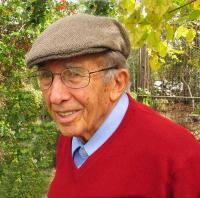
 By C.J. Lin
By C.J. Lin
J. Michael Hagopian, a twice Emmy Award-nominated filmmaker whose 70 documentaries on the Armenian Genocide won more than 160 awards, has died. He was 97.
Hagopian, a survivor of the genocide that killed an estimated 1.5 million people in Turkey from 1915-23, died Friday of natural causes at his home in Thousand Oaks.
Hagopian filmed nearly 400 interviews of survivors and witnesses to the genocide from around the world, and made 17 documentaries about Armenian heritage, culture and history.
“Mr. Hagopian's documentary films on the Armenian Genocide are a path-breaking work that will help inform generations to come of the facts of the first genocide of the last century,” said Rep. Adam Schiff, D-Pasadena, who screened some of the films on Capitol Hill and worked with the filmmaker on a variety of local Armenian issues. “He will be deeply missed.”
Hagopian received two Emmy nominations in 1976 for “The Forgotten Genocide.” His last film in a trilogy on the genocide, “The River Ran Red,” won Best International Historical Documentary at the Amnesty International Film Festival in November and at the New York International Film & Video Festival in 2009.
“Through his life and career, Dr. J. Michael Hagopian is proof that a single person can change humankind's understanding of itself,” Los Angeles City Councilman Paul Krekorian said in remarks made several months ago at a commemoration for Hagopian. “He is proof that we can rise above intolerance and ensure future generations are armed with the information needed to combat bigotry in all forms.”
Hagopian founded the Armenian Film Foundation in 1979, a Thousand Oaks-based nonprofit dedicated to documenting Armenian heritage.
“Michael Hagopian was the Simon Wiesenthal of the Armenian people,” said Jerry Papazian, vice chairman of the AFF. “He left a huge legacy. He was a revered figure in the world of human rights.”
In April, Hagopian signed an agreement with University of Southern California's Shoah Foundation Institute – which gathers video testimonies from Holocaust survivors – that will preserve and disseminate the Armenian Genocide interviews.
“Victimization and genocide perpetrated and denied in one part of the world, can become the breeding ground for greater crimes against humanity in another part of the world,” Hagopian said in April. “I have felt that it was my responsibility to educate and inform so that history won't be repeated.”
Born in 1913 in the village of Kharbert in what was then Western Armenia, Hagopian eventually settled in Fresno in 1927. He attended Fresno State University and received his bachelor's and master's degrees in political science from UC Berkeley and earned another master's and a Ph.D. in government and international relations from Harvard University. He served in the U.S. Army Air Corps during World War II before teaching at UCLA and other respected universities. He later attended USC film school.
In his early film career, Hagopian created educational movies about world cultures and became the first man to film in color the entire length of India's Ganges River, trekking 1,500 miles to its source.
He was to return to India in January to film the family of a genocide survivor that he had documented in 1950 and 1978 and was working on a written autobiography.
“He had such varied interests and kept all of them going his entire life,” said daughter Joanne, who was to accompany him. “He was just continuing to live life to its fullest.”
In his private life, Hagopian was an avid gardener, tending about 80 fruit trees in his backyard and pressing olives and making preserves. He doted on his five grandchildren, ages 1 to 12, writing them notes and buying them presents.
“He was very thoughtful and very warm,” Joanne said. “I feel like I've lost a part my soul.”
Hagopian is survived by his wife, Antoinette, and four children.
Funeral services will be held Wednesday at 2 p.m. in Samuelson Chapel at California Lutheran University, 60 W. Olsen Rd., Thousand Oaks.
Source: “Daily News Los Angeles”, 13 December 2010
http://www.dailynews.com/ci_16850872
